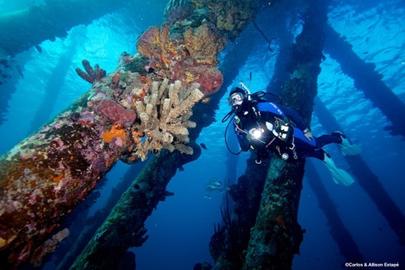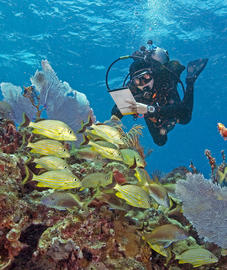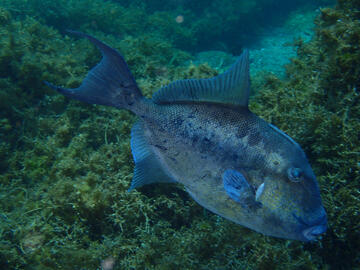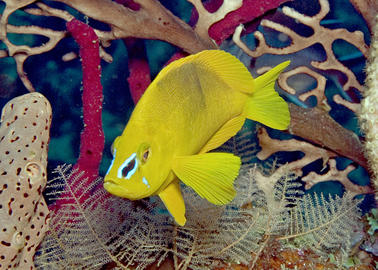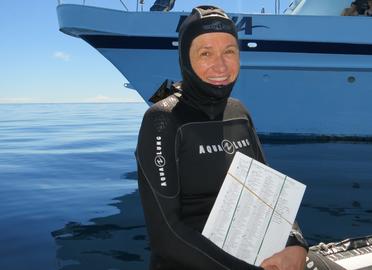Last week, Reef Environmental Education Foundation (REEF) celebrated the 150,000th fish survey processed in the Tropical Western Atlantic (TWA) survey region as part of the REEF Volunteer Fish Survey Project. Volunteer divers and snorkelers made this significant milestone possible. Over 11,000 REEF volunteers have submitted surveys at over 8,000 sites throughout Florida, the Caribbean, and Bahamas since the program’s beginnings in 1993. You can get involved with the Volunteer Fish Survey Project by attending a Great Annual Fish Count Event, taking place throughout the entire month of July!
Are you an experienced REEF surveyor in the Tropical Western Atlantic (TWA)? If so, you might want to check out our brand new underwater survey paper featuring an extended list of species. The double-sided list fits on the regular yellow slate. The longer list of species means less write-in species and more efficient data entry. When entering your data, just select the longer list in the "Species View" field at the top of the data entry field. You can find the new paper in REEF's online store here - http://www.reef.org/node/433.
We are proud to announce that on July 1st 2017, the number of REEF Volunteer Fish Survey Project surveys conducted by volunteers in the Tropical Western Atlantic (TWA) region topped 150,000! The 150k surveys have been conducted by 11,123 volunteers at 8,837 sites in the TWA region (which includes the Caribbean, Bahamas, and Gulf of Mexico). The first surveys in the TWA were conducted 24 years ago in Key Largo.
Biogeographic and Seasonal Differences in Consumer Pressure Underlie Strong Predation in the Tropics
Tropical regions are, in general, more diverse than ecosystems at higher temperate latitudes. A commonly held hypothesis is that the diverse predators in tropical regions cause predation to have a relatively stronger role in shaping communities. Data from the REEF Volunteer Fish Survey Project (VFSP) were used by Michele Repetto and colleagues from the Smithsonian Tropical Research Institute to test for underlying differences in regional fish diversity that could contribute to variation in predation intensity and impact.
Tropical regions are, in general, more diverse than ecosystems at higher temperate latitudes. A commonly held hypothesis is that the diverse predators in tropical regions cause predation to have a relatively stronger role in shaping communities. Data from the REEF Volunteer Fish Survey Project (VFSP) were used by Michele Repetto and colleagues from the Smithsonian Tropical Research Institute to test for underlying differences in regional fish diversity that could contribute to variation in predation intensity and impact.
After several years of planning and collaborating with local marine scientists and divers, REEF has expanded the Volunteer Fish Survey Project into another region: the South Atlantic States (SAS). Recreational and scientific divers in North Carolina, South Carolina, and Georgia now have survey materials specific to the local ecosystem, including waterproof color ID cards, waterproof survey paper, teaching curriculum, data entry, and online data summaries.
While every one of REEF’s 10,000+ volunteers who have conducted a survey as part of the Volunteer Survey Project are Making Dives That Count, there is a small cadre of surveyors who have taken their passion for fish and critter watching to the next level. They are the volunteers, those most active in each of REEF’s project regions, who have actively strived to move through the REEF Experience Level system, often becoming REEF Experts and members of the Advanced Assessment Team (AAT).
Home to eight of the most species-rich sites in REEF’s Caribbean database, the reefs of Bonaire are legendary among underwater naturalists. Participants will enjoy a fun-filled week of up to 12 boat dives on a spacious dive boat, as well as unlimited shore diving throughout Bonaire's marine park. |
The study used REEF's Volunteer Fish Survey Project database to produce a new map of marine fish biodiversity across the Caribbean and tropical western Atlantic. The work, performed by scientists from the Center for Macroecology, Evolution & Climate in Denmark and the Marine Biological Association, studied REEF’s extensive data base collected by our volunteer surveyors to produce the map and find that fish biodiversity is strongly linked to sea temperatures.
REEF is proud to announce Janet Eyre as our 2016 Volunteer for the Year. Janet has been a REEF member since 2002, and she is one of REEF’s most active surveyors. She is a Golden Hamlet member and to date has conducted 1,612 surveys (and counting!).

